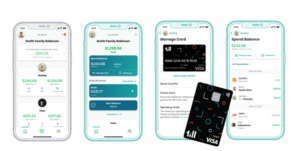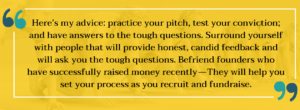
#FrontRunners is a series of spotlights on prominent members of the Luge Capital network. We are fortunate to have access to this network and wish to share with FinTech entrepreneurs their industry insights and tips on partnering with their organizations.
In this #FrontRunners edition, we welcome former entrepreneur Peggy Mangot who is now the Operating Partner for PayPal Ventures. Peggy brings a unique perspective with broad experience across traditional financial institutions, the FinTech startup ecosystem and large technology companies. Prior to PayPal Ventures, Peggy was SVP, Innovation at Wells Fargo where she led the development and launch of their challenger bank and its enterprise identity management platform. Prior to that, Peggy was founder & CEO of SparkGift, a Y Combinator backed micro-investing platform. She also held roles at Google (partnership management for payments & commerce) and Visa (US consumer products).
I am a partner with PayPal Ventures where I help make investment decisions, help bring strategic learnings back to PayPal leaders and work to support our portfolio companies.
WHAT EXCITES YOU THE MOST ABOUT PAYMENTS AND BANKING RIGHT NOW, AND WHAT KIND OF INNOVATION DO YOU BELIEVE THE WORLD NEEDS?
I am very excited about family banking, which is mobile banking experiences designed specifically for families — helping parents provide money for day-to-day spending, giving kids their own debit cards and encouraging them to learn how to save money responsibly. This is still a nascent market today, but in five years it will be a huge industry that will seem obvious.
The reason I care so much about this space is not just because it addresses a large unmet practical need for parents and young people, but it presents the opportunity to “teach money” to the next generation. By providing intuitive tools and giving this segment control and agency at a young age, we have the opportunity to create a more financially healthy Gen Z. Learning by doing, in partnership with parents and community, will help this cohort develop better habits for spending, saving, giving and investing… and that’s incredible. Because I believe so strongly in this mission, I’m a proud angel investor in Till Financial, the collaborative family banking platform, alongside Luge Capital.

WHAT ARE SOME NON-OBVIOUS INSIGHTS ABOUT YOUR INDUSTRY?
The FinTech-engagement trade-off. In financial services, there is a trade-off between “engagement” and “automation”. By nature, a FinTech company (or any company) wants to drive engagement, because that is how you deepen the relationship with individual consumers, small businesses or commercial customers.
But what if that frequent engagement isn’t in the best long-term interest of the customer? The robo-advisor industry struggles with this conundrum as their business is based on a well-researched “set it and forget it” model to achieve a financially-secure retirement, based on regular contributions into a basket of low-cost exchange-traded funds (ETFs). This epitomizes the automation approach but it doesn’t provide a lot of room for robo-advisors to deepen the customer relationship, since low engagement is part of the model.
When FinTech founders are building a business, they need to recognize this balance and structure engagement around activities that are in the best interest of their customer and the outcomes their customers are trying to achieve.
AS A FORMER FOUNDER YOURSELF, WHAT ADVICE WOULD YOU GIVE TO FIRST-TIME FOUNDERS?
As a founder in the early stages, you are your company. The company is a manifestation of your view on how the world should be better. Team members and investors will come on board based on your passion, your vision, your articulation of the problem you’re solving and your perspective of the size of the addressable market.

As a first-time founder, fundraising may be harder but that’s because you don’t have that second-time founder signaling. You also don’t have that real world experience of running a fundraising process.
Watch out for imposter syndrome. It’s real. Imposter syndrome is common for first-time founders and if you don’t manage it, it can creep into your level of confidence and conviction.
YOU’VE WORKED AT LARGE FINANCIAL INSTITUTIONS LIKE WELLS FARGO AS THE SVP INNOVATION. HOW SHOULD FINTECH FOUNDERS NAVIGATE THOSE COMPLEX ENTERPRISES FOR PARTNERSHIP OPPORTUNITIES?
I have two practical recommendations:

The reason I say this is that the Innovation and R&D teams are great for making introductions to the business, but I do not recommend pursuing a proof-of-concept with that part of the organization, unless the business/P&L owners are fully on board.

Prepare yourself for this practical reality. Consider selling into mid-sized institutions to hit your numbers until you can scale your sales team accordingly.
“MOVE FAST AND BREAK THINGS” OR “PLAN AND PROGRESS METHODICALLY”?
“Move fast and break things” doesn’t work when building products in FinTech because 1) we are dealing with people’s money and 2) we need to comply with regulations, which can take time.
However, “move fast and break things” does make sense when it comes to marketing, communications and customer acquisition. One of the biggest advantages that FinTechs have over most traditional financial institutions is their marketing agility — testing and learning, pivoting quickly and seizing upon the zeitgeist of the moment to make their company stand out. Efficient customer acquisition is the biggest advantage successful FinTechs have versus their traditional counterparts and that is where they should absolutely lean in.
HOW HAS COVID-19 IMPACTED THE PAYMENTS AND BANKING INDUSTRIES IN GENERAL? HOW DO YOU THINK THEY WILL EVOLVE POST-COVID?
I’ll use a line I have used before, “You don’t go to a bank branch to meet a date, share a meal, or order a cocktail.” My point is that I believe bank branches are essential, but we now need fewer than before. Covid forced large financial institutions with a branch network to accelerate sales & servicing to digital. Covid accelerated the product roadmap for digital account opening and digital servicing forward 18–24 months. For these transactions, consumers will never come back to the branch.
Covid has been an accelerator for digital banking from all providers — challenger banks and large FIs. I’m still a believer in branches, as they help a lot of people on the edge access financial services. I am, however, happy that a lot more people will have their needs met by services available in their hands, on their phones.
You can follow Peggy Margot on Twitter to keep in touch with her thoughts on FinTech, financial health and investing.
See you soon for our next spotlight & you can follow Luge Capital on Twitter, LinkedIn, or by signing up for our newsletter to get updates and the latest news about the industry and Luge.
